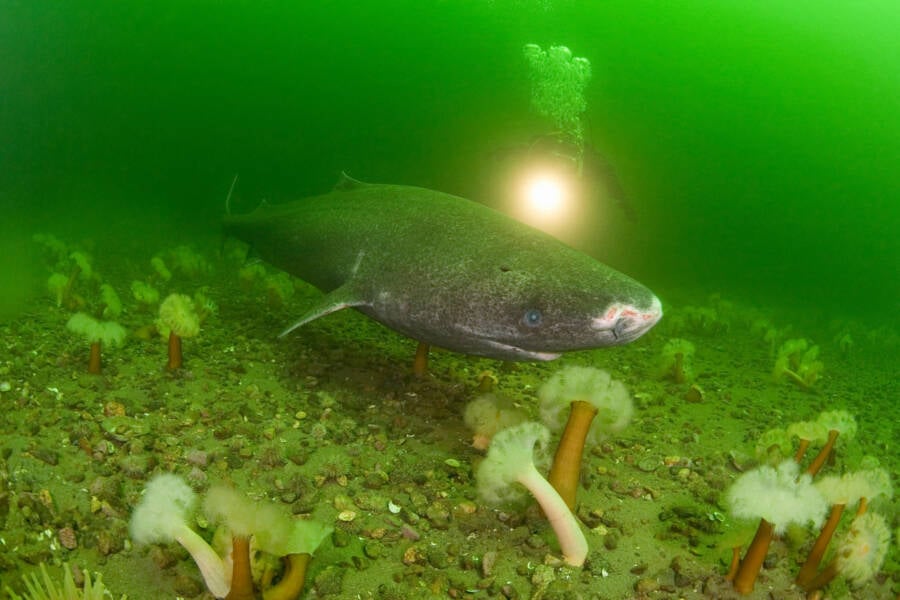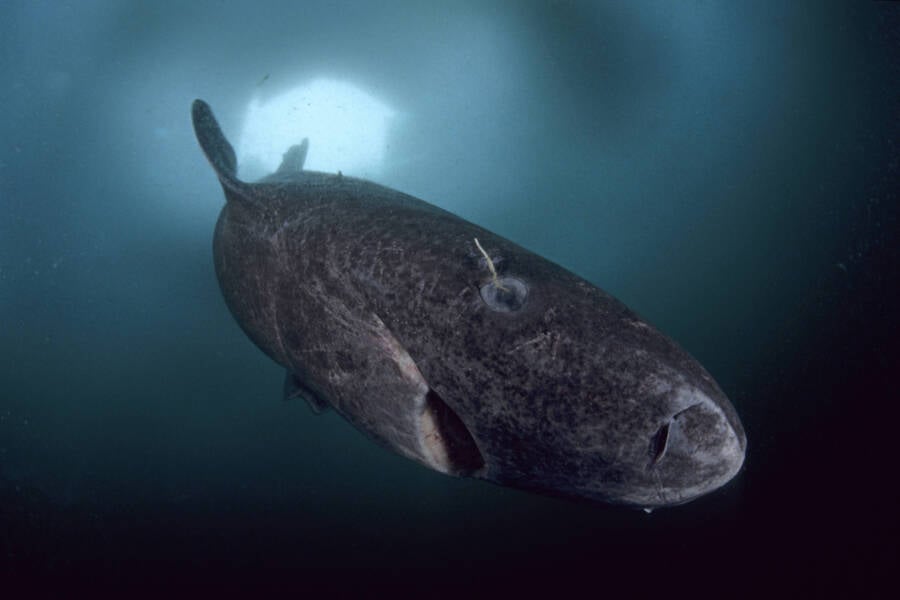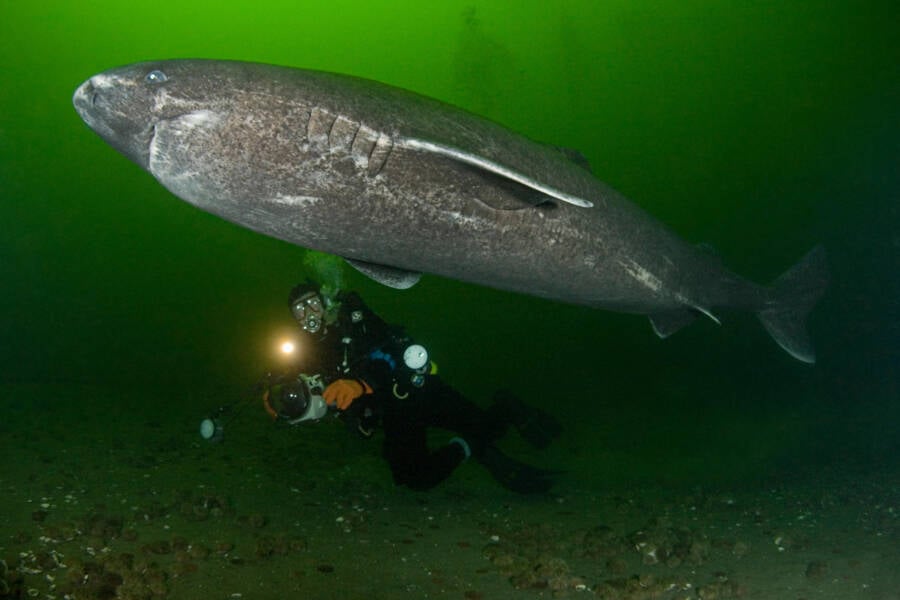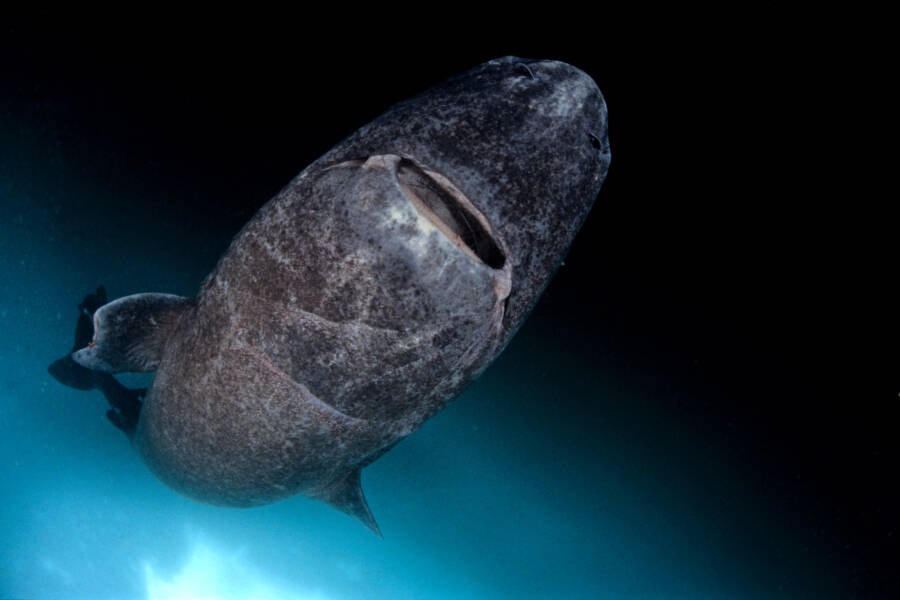Greenland sharks can measure more than 20 feet long, swim less than two miles per hour, and live up to 500 years.

Doug Perrine / Alamy Stock PhotoA diver swims with a Greenland shark (Somniosus microcephalus) in Canada’s St. Lawrence River.
The Igloolik people of Nunavut call the creature “Skalugsuak,” after an old Inuit legend that claims that it lives in the urine pot of the sea goddess Sedna. But most people know it as the Greenland shark.
The giant fish is unique among other sharks for many reasons, such as its chilly habitat and its slow movement. However, what sets the species apart the most is the Greenland shark’s lifespan: a staggering 500 years.
Scientists have several theories about Earth’s longest-living vertebrate. Some experts believe a slow metabolism contributes to their shocking lifespan of the Greenland Shark. Others have found evidence that the creatures’ genes hold the answers to how they can live for centuries.
From Indigenous legend to modern DNA analysis, the Greenland shark continues to captivate the world.
The Unique Characteristics Of The Greenland Shark
With their small eyes, round snouts, and dull coloring, Greenland sharks aren’t the most striking sea creatures. They’re often plagued by worm-like parasites that trail from their eyes, and they have an unpleasant odor.
Because of high levels of urea and trimethylamine oxide in their bodies, the sharks’ flesh smells like urine and is toxic to humans if consumed raw. These compounds act as a sort of natural antifreeze to keep the fish alive in the cold waters of the Arctic and North Atlantic that they typically call home. The sharks have been known to dive more than a mile beneath the ocean’s surface, where it’s dark and frigid.

Avalon.red / Alamy Stock PhotoA Greenland shark with an eye parasite known as Ommatokoita elongata, which permanently attaches itself to the creatures’ corneas.
The Icelandic people consider the flesh of the Greenland shark to be a delicacy and put it through a months-long fermenting process in order to render it safe to eat. Without it, the effects of the meat cause symptoms similar to severe alcohol intoxication.
The sharks survive on a diet of mostly halibut and other large fish — though the remains of polar bears have been found in their stomachs. However, it’s unclear exactly how they catch some of their prey, as they move at an incredibly slow pace of less than two miles per hour.
On average, Greenland sharks grow to between 13 and 16 feet in length, but individuals up to 24 feet long have been spotted. What makes the sharks so fascinating, however, is not what we do know about the species — it’s what we don’t.
How The Greenland Shark Pushes The Boundaries Of Longevity
In 2016, researchers published a study in Science after radiocarbon dating 28 Greenland sharks. They tested proteins in the creatures’ eye lenses that do not renew themselves and thus can reveal how long ago a shark was born. Radiocarbon dating cannot pinpoint a specific date, but the oldest shark the scientists analyzed was between 272 and 512 years old.

Doug Perrine / Alamy Stock PhotoThere are no recorded attacks on humans by Greenland sharks, but a man’s leg was reportedly discovered in the stomach of a shark caught in Canada in 1859.
Julius Nielsen, a marine biologist and the lead author of the study, told the BBC at the time, “Even with the lowest part of this uncertainty, 272 years, even if that is the maximum age, it should still be considered the longest-living vertebrate.”
But what is it that allows these sharks to live so long?
Scientists have historically attributed the Greenland sharks’ advanced age to the cold waters that it lives in, which range from roughly 33 to 53 degrees Fahrenheit. They thought that the nearly freezing temperatures slowed the creatures’ metabolism. When the metabolic process slows, everything slows — including aging. This impacts other behaviors as well, contributing to the creatures’ snail-like speed.

WaterFrame / Alamy Stock PhotoA Greenland shark under the ice off the coast of northern Baffin Island in Canada.
Greenland sharks also take their time with physical development, growing very slowly — just one-third of an inch per year. Females of the species don’t reach sexual maturity until they are more than a century old. What’s more, they have an estimated gestation period of up to 18 years.
However, modern research has revealed another possibility for the Greenland shark’s lifespan: its DNA.
In 2024, a team of scientists published their findings after successfully mapping the genome of a Greenland shark. They discovered multiple copies of genes that support the immune system, regulate inflammation, and repair DNA, which would prevent the species from getting cancer and promote healthy aging. The researchers stated that studying the way Greenland sharks’ DNA works may unlock more methods to treat cancer and other diseases in humans.
Unfortunately, the future of this shark is uncertain thanks to both fishing practices and climate change.
The Future Of The Longest-Living Vertebrate
Greenland sharks were once heavily hunted for their liver oil, and while that practice has ceased today, their population decreased dramatically through the 1970s. In the early 20th century, 32,000 Greenland sharks were caught each year to meet liver oil demand, with approximately 50,000 killed in 1948, according to the International Union for Conservation of Nature and Natural Resources.

Public DomainGreenland sharks were regularly fished for their liver oil until the 1960s. This 1,600-pound specimen was caught in 1905.
In modern times, the creatures are frequently caught in fishermen’s nets unintentionally. This has led to their classification as a “vulnerable” species — just one step below endangered.
It is hard to say how many Greenland sharks currently inch through the world’s waters, but researchers are confident that their species has been threatened by both human activity and climate change. It’s estimated that ice loss and ocean warming due to climate change will greatly diminish the sharks’ habitat. This would make it more difficult for them to hunt for food, as their prey may also see hits to their populations due to the diminishing Arctic ice.
This habitat loss could also increase the amount of fisheries present in Arctic waters as non-Arctic fish move into the warming areas. What’s more, these new fish may add to the competition for food, yet another barrier to the survival of the Greenland shark.

Chris_huh/Wikimedia CommonsA map that shows the typical range of the Greenland shark, though individuals have been found as far south as Belize.
Already, the sharks’ population is estimated to have decreased by 30 to 49 percent. However, it’s difficult to truly gauge how vulnerable the species currently is. Because it takes over a century for Greenland sharks to reach the point where they can reproduce, disrupting the environments of young individuals or removing them entirely could potentially have dramatic impacts on the entire population far in the future.
So, while we marvel at the Greenland shark’s lifespan, it is also important to remember just how much this incredible species has experienced — and how much it can teach us.
After reading about Greenland sharks, learn all about the mako shark, the “cheetah of the ocean.” Then, go inside the 1916 shark attacks at the Jersey Shore.





